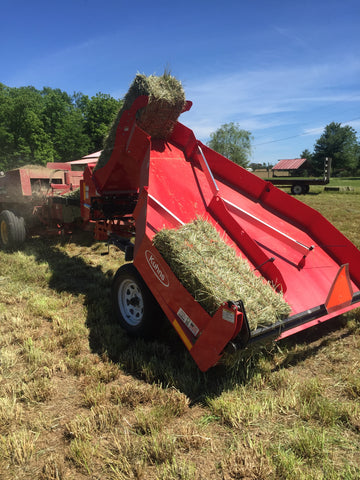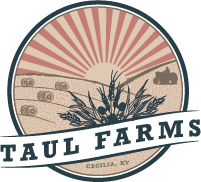Our family farm is small but we work hard to provide the most natural organic hay possible.
We are at least 8th generation farmers and 2nd generation on our family farm in central Kentucky. We have 20 acres of hay in 2 fields; 1 of the fields within a stone’s throw of our house. Our hay is a mixture of 100% organic orchard grass, endophyte-free Kora fescue and red and white clover. This is a healthy mixture of natural fiber and protein. There’s no need to manually/ unnaturally mix grasses/legumes. There are no additives, preservatives, pesticides or GMO products.
We’ve been supplying healthy organic hay to horse and livestock farms for about 10 years. We produce small square bales of hay – dimensions are about 35”x16”x14” and store them in our hay barns. These bales range from 45lb to 60lb and average about 50lb, depending on how much clover happens to be in that bale. We also bale up large round bales. These bales are about 4x5 ft that weigh about 750lb also stored in barns.
We are about 9 years farming organically counting our 3 year transition time and became certified organic June, 2019. We are certified organic by the Kentucky Department of Agriculture and approved to use the USDA (US Department of Agriculture) Certified Organic seal. We are in the USDA Organic Integrity Database (https://organic.ams.usda.gov/integrity/ ). Our farm is also certified by the Real Organic Project which was started by farmers to protect the meaning of organic. Real Organic remains exactly what organic was always intended to be. (https://www.realorganicproject.org/).
We are still learning about organic hay and rebuilding our soil after decades of conventional corn/soybean production. Growing and harvesting hay in Kentucky isn’t easy, especially utilizing organic practices. The rainy weather in the spring and typical dry weather in late summer can be very challenging. We don’t irrigate our fields, so if we go weeks and months with very little rain, then productivity is significantly reduced. Our organic certified grass and clover seed and organic inputs/ fertilizers (chicken litter, gypsum, etc.) are all expensive and not easy to find. But we think it’s worth it to build up the soil to sustain productivity for many decades and to provide very healthy hay for horses, cattle, sheep, goats and other animals.

The Farming Family
My name is Keith and I grew up on this farm in central Kentucky. It was a dairy farm, so life was great with plenty of work to do every day. My dad, Philip, was a very hard worker and forward thinker/innovator. Honestly, I didn’t enjoy the twice daily milking schedule and neither did my siblings, so dad sold the cows many years ago. After college at the University of Kentucky (BS and MS in Agricultural Engineering) I spent many years working in manufacturing in quality and continuous improvement. The past 10 years have been focused on restarting our family farm by transitioning about half of it over to organic hay. My wife, Megan (BS in Production Agriculture) works hard to help make this happen. We enjoy the challenges and the benefits of small farm life and developing a sustainable organic farm operation that provides healthy hay.
Our family farm is small but we work hard to provide the most natural organic hay possible.

















